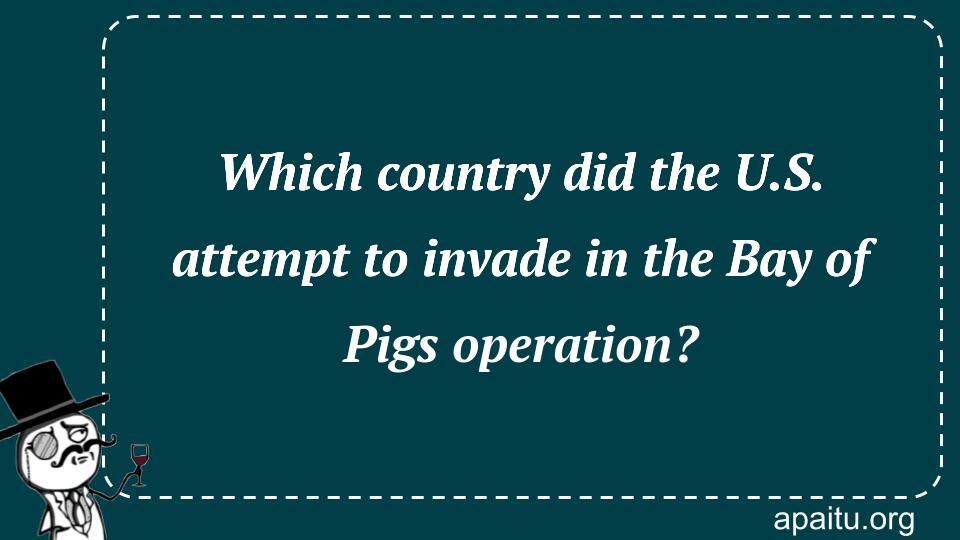Question
Here is the question : WHICH COUNTRY DID THE U.S. ATTEMPT TO INVADE IN THE BAY OF PIGS OPERATION?
Option
Here is the option for the question :
- Cuba
- North Korea
- Germany
- Japan
The Answer:
And, the answer for the the question is :
Explanation:
On April 17, 1961, there was an attempt to invade Cuba at the Bay of Pigs. 1,400 Cuban refugees who were part of the invading army and receiving American help attempted to topple President Fidel Castro. Nearly all of the invaders were either killed or arrested during the disastrous operation, which left President John F. Kennedy and his government with a terrible reputation.

In the annals of history, there are pivotal moments that shape the course of nations and define the relationships between world powers. One such moment occurred in 1961 when the United States embarked on a covert military operation known as the Bay of Pigs invasion—an ill-fated attempt to overthrow the government of Cuba. This audacious undertaking, shrouded in secrecy and mired in political complexities, aimed to undermine the newly established revolutionary regime led by Fidel Castro.
Cuba, the vibrant Caribbean island known for its rich culture, picturesque landscapes, and turbulent history, became the focal point of Cold War tensions between the United States and the Soviet Union. Following the Cuban Revolution in 1959, Fidel Castro transformed the country into a socialist state, aligning it with the Soviet Union and adopting policies that directly challenged American interests in the region. This ideological shift, coupled with concerns over the spread of communism, prompted the United States to plan a clandestine operation to remove Castro from power.
The Bay of Pigs operation, named after the location of the planned landing site on Cuba’s southern coast, was devised as a paramilitary intervention led by the Central Intelligence Agency (CIA). The goal was to train and equip a force of Cuban exiles, known as Brigade 2506, to launch a surprise attack and ignite a popular uprising against Castro’s government. The operation was meticulously planned and received support from high-ranking officials within the U.S. government.
On April 17, 1961, the invasion force consisting of approximately 1,500 Cuban exiles, armed and trained by the United States, commenced their assault on the beaches of the Bay of Pigs. However, the operation quickly unravelled as the invading forces encountered fierce resistance from the Cuban military and a lack of popular support within the country. The ill-fated invasion, plagued by strategic miscalculations and a failure to garner sufficient local support, ultimately ended in defeat for the United States.
The Bay of Pigs invasion had profound implications for both the United States and Cuba. For the United States, it was a significant setback that exposed the limits of covert military operations and highlighted the challenges of implementing a successful regime change. It was a sobering moment that forced the U.S. government to reassess its approach to Cuba and the broader Cold War strategy.
For Cuba, the failed invasion became a defining moment in its revolutionary history. The successful repulsion of the U.S.-backed invasion cemented Castro’s position as a national hero and bolstered the resolve of the Cuban people to defend their sovereignty against external threats. The event also provided the Cuban government with a propaganda victory, showcasing its ability to resist American imperialism and rallying support for the regime among its citizens.
The Bay of Pigs invasion marked a turning point in U.S.-Cuba relations. The failed operation not only solidified the ideological and political divide between the two nations but also set the stage for decades of hostility and strained diplomatic ties. The incident intensified the existing embargo imposed by the United States on Cuba, further isolating the island nation and exacerbating economic hardships for its population.
In retrospect, the Bay of Pigs invasion stands as a cautionary tale of the complexities and unintended consequences of foreign interventions. It serves as a reminder of the risks inherent in covert operations and the challenges of engineering political change in a foreign country. The invasion’s impact reverberated far beyond the shores of Cuba, influencing U.S. foreign policy decisions and shaping the dynamics of the Cold War in the Western Hemisphere.
the United States attempted to invade Cuba in the Bay of Pigs operation—a covert military intervention that aimed to overthrow Fidel Castro’s revolutionary government. The ill-fated invasion, marked by strategic failures and a lack of popular support, ended in defeat for the United States and had far-reaching consequences for both countries. The Bay of Pigs invasion remains a significant chapter in the history of U.S.-Cuba relations, serving as a cautionary tale and a reminder of the complexities of foreign interventions.